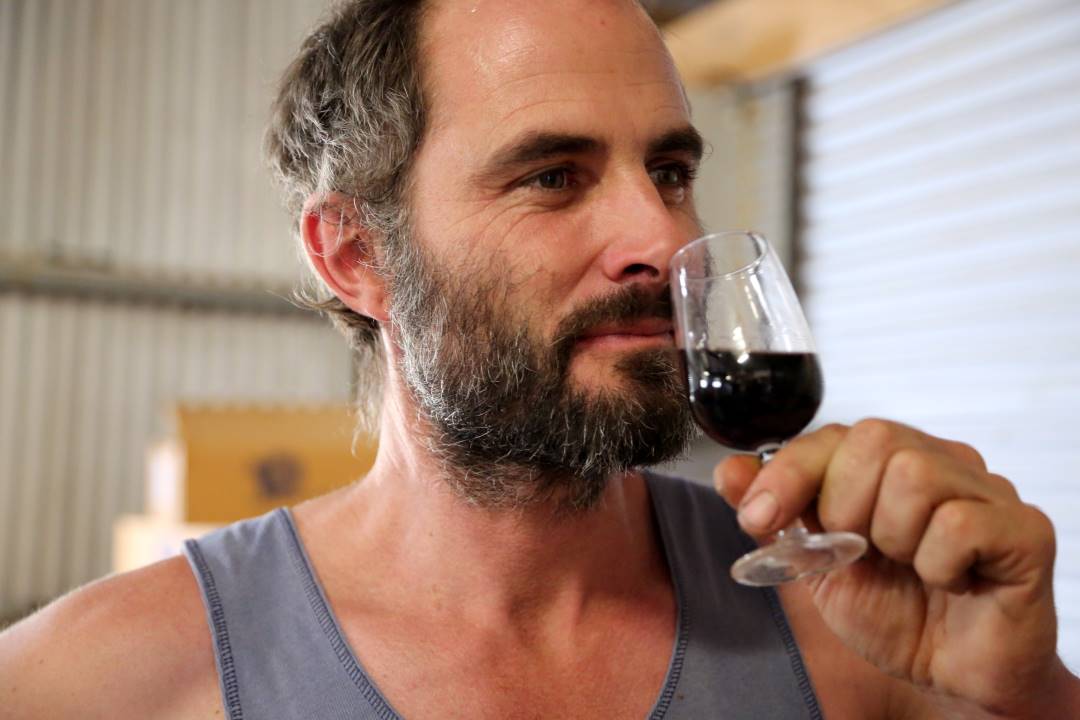
Sam Statham
WINEMAKER AT ROSNAY ORGANIC
“It’s a nerve-racking but satisfying art.”
When did you realise you wanted to become a winemaker?
As a grape grower, I always wanted to make wine but doubted myself as I was never good at chemistry. In 2012, we won the inaugural NSW Organic Pioneers Award. We used the money to visit the south of France and explore organic viticulture and wine, as well as meet my cousins. At a family barbeque I tasted my cousin Sebastian’s “Vin de Garage”. I was blown away. It was as good as commercial wine but made in a garage with minimal equipment and zero additives. Sebastian told me: “If you grow good grapes, you don’t need chemistry to make wine.” In 2014, I made my first wine – Garage Wine No1 Cabernet Sauvignon 2014. It won the NASAA Organic Wine Show in 2015.
Please tell us about your career so far, including your education, work experience etc.
I studied Environmental Geography at university, doing a year in France, where I discovered the French concept of “terroir” – their almost-Indigenous connection with their environment through the diversity of food and wine culture. I then worked on organic and biodynamic farms in New Zealand, before applying for my dream job as a research assistant at the NSW Department of Land and Water Conservation. Meanwhile my parents moved to a new farm at Canowindra. Within twelve months I realised my folly and joined them in their new vineyard venture, and we decided to go organic and biodynamic from day one. I went back to TAFE to learn viticulture and organic farming, completed part of a horticulture diploma, and learned lots of new skills working with my dad and my brother on the farm.
What do you love most about being a winemaker?
I love the fact that you are a connection between the country and the people. The growing of the grapes is a magical cycle – from the “death” of the old vine during winter pruning, through to the rebirth
during budburst in spring, the beauty of flowering and reproduction, then the hardening and toughening of the vine during the oppressive summer heat, before it gives forth its sweet seed as ripe grapes.It’s a nerve-racking but satisfying art. I’ve had many sleepless nights and grey hairs, but it all melts away when you taste the end product over a delicious meal with friends and family.
What is your favourite wine, and what food do you typically pair it with?
My favourite wine is the classic, noble shiraz. However, it’s got to be well ripened, with depth, soft tannin and suppleness. Whilst this would be a typical McLaren Vale style, I believe we can also do it here in the warmer valleys of the NSW Central Ranges.
Is there a specific process you follow when developing a new wine?
I usually take inspiration, such as the Method Ancestrale sparklings of the French Pyrenees, or the carbonic maceration of Beaujolais Nouveau, the amphora-fermented skin contact whites of Georgia, or the sweet Vins Doux Naturels and easy drinking fruity reds of the hot south of France. Then I think about how those traditions can be used to make great wine from our own grapes.
Is there any vintage you’re particularly proud of creating? Why?
Beginner’s luck I guess, but when I won Organic Wine of the Year in 2015 with my first Vin de Garage 2014 Cabernet Sauvignon, my dad said, “let’s build a winery”. I haven’t won it again since, but I wonder if that was some sort of sign that I should let go of self-doubt and fear. Take more risk, build a winery, experiment with more natural methods, and stop using sulphites.
How does the local climate/soil affect thewine you make?
Since we have been using organic farming methods since 1997, our wines are 100 percent reflections of our soil and climate. Our soil is very variable, ranging from
light sandy shallow granite, which is perfect for shiraz and vermentino, to high water holding red volcanic clay, which is perfect for grenache and mourvedre. Then we have our climate which is warm to hot, getting up to the high forties in mid-summer, which means we need to have enough canopy for the fruit to be shaded but not so much that the fruit overcrops and lacks flavour.
Which of your own varieties do you typically indulge in?
I love to indulge in vermentino. The semi sweet Bon Bon is my “party wine” where there are no rules, and you can even pour it over ice. The dry Freedom Vermentino is a great lemony food wine paired with pasta carbonara, chicken, even just fish and chips.
Where do you see yourself in five years? How do you think your winemaking will evolve during this time?
This vintage I have been making wine with other winemakers here in my winery. It’s been so great to have winemaking buddies, and I hope that they will still be with me in five years’ time, making their own unique and delicious wines, inspiring me with new
ideas for my own wines, and working together as a team.
Is there anything else you would like to add?
The building of our cellar door has been the final piece of the puzzle here at Rosnay, so that we can grow our own organic grapes, make the wines on site, and sell them directly from our cellar door. We can not only get direct feedback from people as
they taste, but we can give them a unique and deep insight into the mystery of winemaking, as well as the sustainability and potential of organic farming in Australia.
From Wineries of New South Wales – Issue 1, edited by Jess Muller
